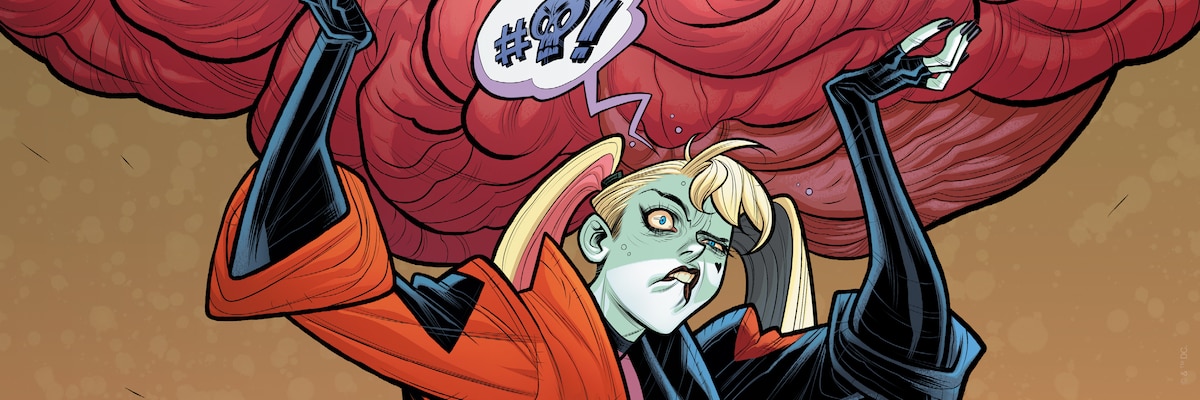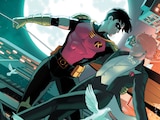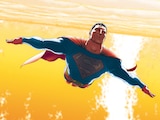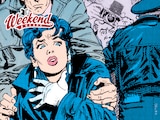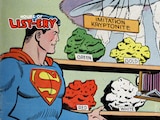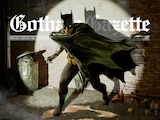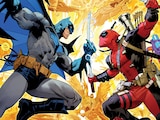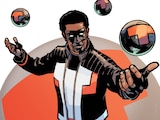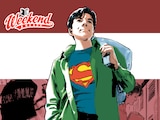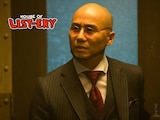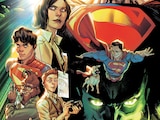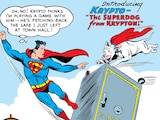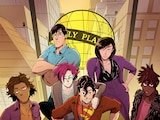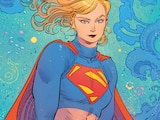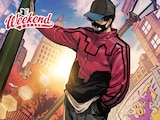There’s really no competition for it. Harley Quinn is DC’s most popular comedy character. Co-created by Paul Dini, who came up in cartoons, and inspired by the clown act of originating performer Arleen Sorkin, Harley was grounded in comedy even before she was cast as a figure of tragic romance and sapphic redemption. So, here’s the question: why are so few of Harley Quinn’s writers…you know…comedy writers?
Elliott Kalan, former lead writer of The Daily Show and Mystery Science Theater 3000, and co-host of the long-running world’s funniest movie podcast, The Flop House, is here to fix that. Now more than half a year into his tenure on Harley Quinn’s flagship comic, we took the opportunity to dig a little deeper into Kalan’s perspective on the book just in time for this week’s Harley Quinn #50.
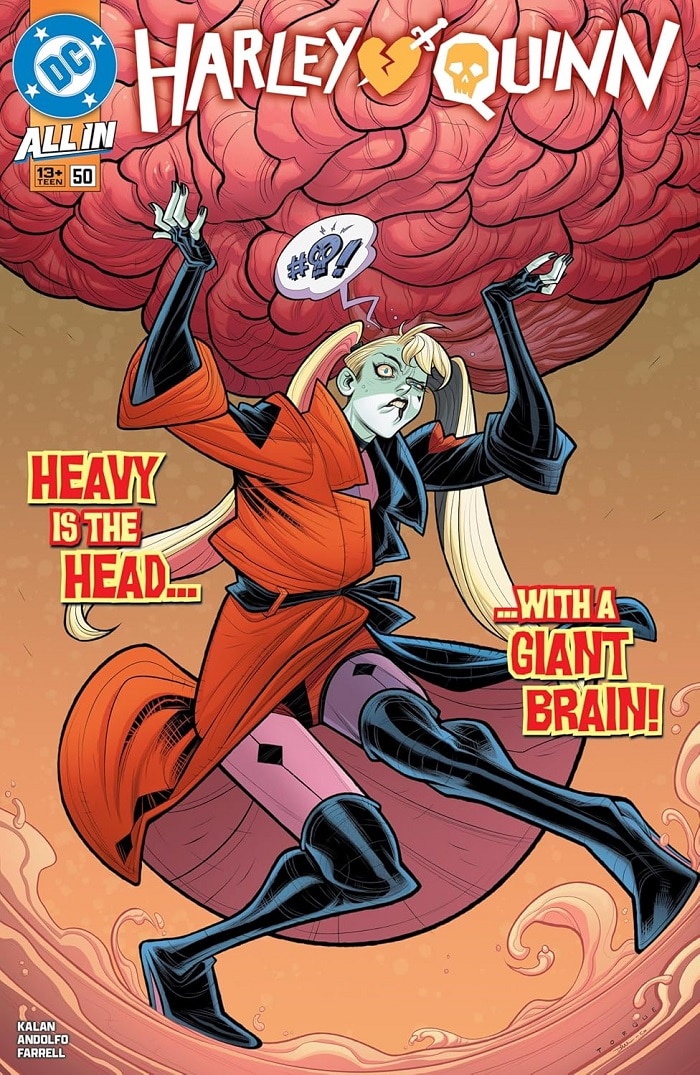
Harley's new home of Throatcutter Hill is pretty clearly a cipher for a particular neighborhood of New York City. Is it meant to stand in for a specific area? How personal Is Harley's struggle against gentrification to you?
They say write what you know, so for me that means writing about a gentrifying Brooklyn-esque neighborhood. I spent many years in Park Slope, a Brooklyn neighborhood that was already pretty far along its gentrification journey, with lots of new high rise developments going up, but still retaining a few pockets of the preceding world. Harley's landlady, Mrs. Grimaldi is extremely loosely based on my beloved former landladies.
As someone who's interested in 1) cities and 2) older things, it's pretty knee-jerk for me to be anti-gentrification, but at the same time, I've definitely benefited from it in the places I've lived. So, I wanted to bring some of that to Harley—the yearning for something to stay the way you prefer it, but the slowly dawning realization that your presence is making it harder for it to stay that way. What a not funny answer to a question in a Harley Quinn interview!
Many less familiar with Harley Quinn tend to draw comparisons between her and a certain "mouthy mercenary" from another publisher. What makes Harley Quinn stand out as a unique comedic voice?
No offense to that other guy, who I'm sure I don't know who you're talking about even though I've written for him before, but he's usually a little more of an out-and-out cartoon character prone to basing his jokes around pop culture references. Harley is also a funny chatterbox, but she's got more of an emotional core to her comedy. To me, when Harley is making jokes, she's doing it because she wants to entertain, even if she's only entertaining herself. She's her own Greek chorus, using comedy to express herself and react to what she's experiencing, rather than just making disconnected jokes to annoy people. Though she does enjoy annoying people.
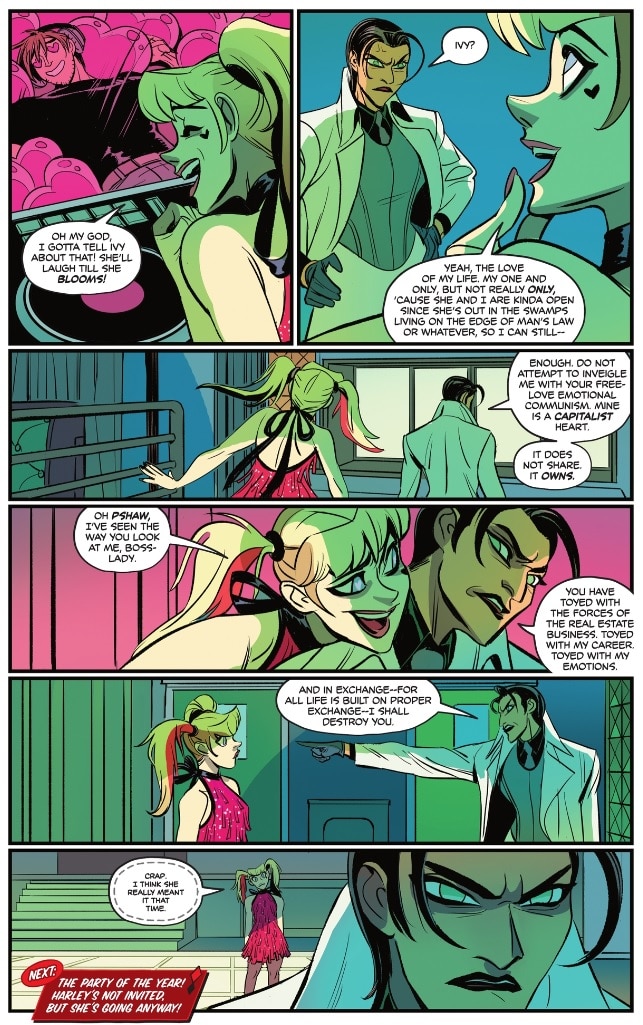
Between your Harley Quinn and G. Willow Wilson's Poison Ivy, we've been seeing a lot of psychosexual polyamorous drama play out between Arkham's it couple and their respective thirds. How do you see their relationship dynamic, and where does Throatcutter Hill's stern real estate magnate Althea Klang fit into it all?
Ivy is undoubtedly Harley's soul mate and truest love, but in today's modern world, why should they have to play by the old-fashioned rules of sexual scarcity? Harley and Ivy are like two binary stars, revolving around each other and occasionally pulling planets into their orbit.
Althea Klang has larger designs on Harley—she doesn't want to be a third, but wants to be Harley's new soul mate and truest love. But so much of their sexual tension is built around being in conflict and competition with each other, while Harley and Ivy's attraction is about mutual appreciation and shared interests, like crime. My original intention with Althea was to give Harley the sort of "romantic tension nemesis" that so many other heroes have had. As a result, normally, I'd say Althea doesn't have a chance, but who knows? What if some new situation were to come along and MAKE HARLEY FUNDAMENTALLY QUESTION HER STATUS WITH IVY?!
Hey, I'm just saying, it could happen...
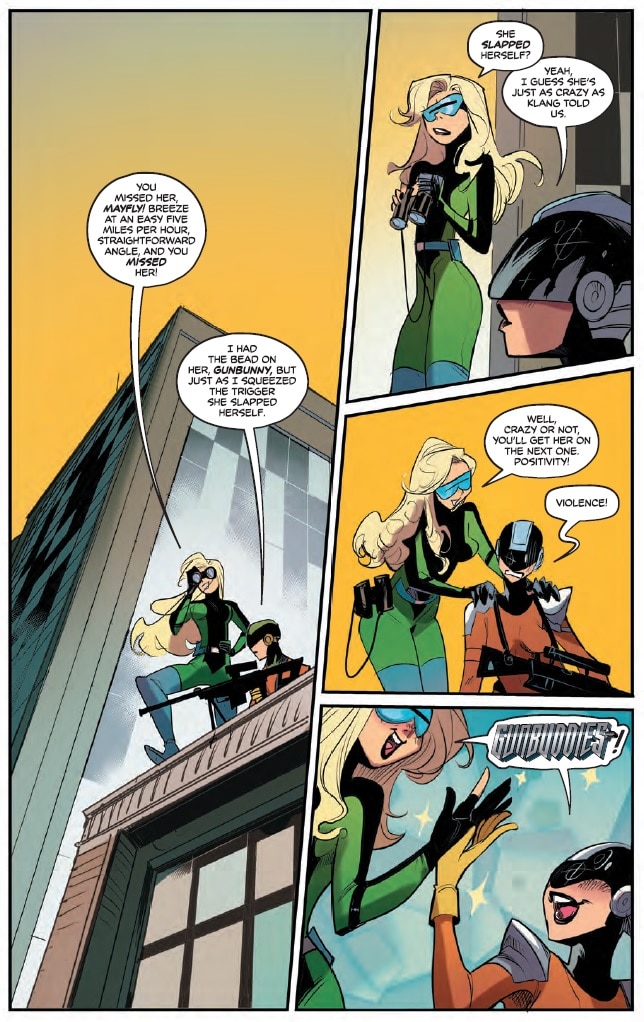
For a comic that's mostly focused on original characters in a brand-new Gotham neighborhood, I've been surprised by all the care and research that has gone into fitting this book in the greater DC Universe. As a person who keeps track of all these characters and continuities for DC.com, the Clayface Reunion in Harley Quinn #47 was a particular delight for me personally. What was the process like making sure you got all your Clayface facts straight? And are there any more obscure corners of Gotham you're planning to touch on?
I wish I could say that I was an expert in the current DC Universe, but for that I rely very heavily on my editors, Arianna Turturro and James Reid, who do a great job of keeping my continuity in line and helping me find the right (meaning "still alive") characters to throw Harley's way. For the Clayface reunion, I literally think I said, "Can you give me a list of all the active Clayfaces?" In an issue that's coming up, I needed some mercenary characters, and my editorial champions provided me with some options, from which I chose Mayfly and Gunbunny, who I'm teaming together as best friends who call themselves the Gunbuddies, and they're now possibly my favorite characters to write in the book.
In the future, I'm looking to bring in more lesser lights of the Gotham-area DCU, and hopefully polish them up and make them special again. I'm also going to throw some new characters in every now and then, too, not that I think I'll ever top Convoy, the Entruckulated Man, the new character find of 2025.
Let's address the stench in the room. Back in November, your Harley Quinn #45 featured an elaborate issue-long set up to one very well-executed fart joke. But this month, your colleague Joanne Starer stole our breath with Harley Quinn Fartacular: Silent Butt Deadly. Do you have anything to say to her butting in on your thunder?
I'll clarify that my joke was really an ART joke about the word fart, and mostly an attack on perhaps my least favorite real-life sculpture in the history of art. As for the Fartacular, I'd love to say that I'm a high-class comedy guy who has no time for fart jokes, but anyone who's met me knows that isn't true. If anything, though, Ms. Starer so thoroughly covered the subject of Harley's flatulence that I feel like anything I'd say about it in my own book would be redundant.
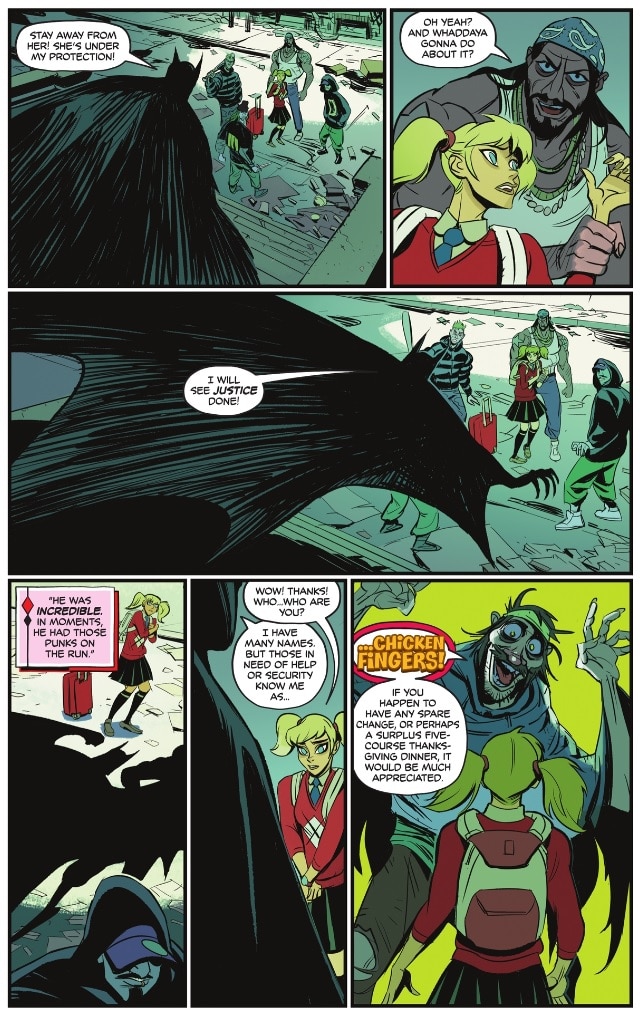
Just because I'm sure you've thought more about this than anyone, I'd love to learn more about the secret past of Throatcutter Hill's resident street-dwelling crimefighter, Chicken Fingers. What synopsis could you give us for Chicken Fingers: Year One?
You're in luck, because in an upcoming issue, you will learn the secret origin of Chicken Fingers! I don't want to give away too much about it, but the hope (as with the recent mini-origin for Althea) is to introduce these characters as silly figures and then deepen them. So, Chicken Fingers: Year One would start with Chicken Fingers taking on the mantle of Throatcutter Hill's self-appointed protector and see him convince the locals that he doesn't deserve to be institutionalized by saving everyone from...let's say the Refuse Men, an organized crime mob of sanitation workers.
You've been writing and podcasting about movies, from all-time classics to all-time flops, since at least 2008. In Harley Quinn #50 this week, we see Harley taking on a lot of responsibilities for a block party. If we were giving her the job of programming a film festival on top of that, what movies would she pick?
The trap here is that I'll probably just end up listing movies that I like. But to get across the many facets of Harley's personality, first she'd start with a triple-feature of Preston Sturges comedies where ladies make fools out of men: The Palm Beach Story, The Miracle of Morgan's Creek and The Lady Eve. Then she'd follow that with a duo of Susan Seidelman movies about women in search of their identity in the big city, Smithereens and Desperately Seeking Susan. And finally, when the audience was too tired to put up a fight, she'd assault them with the ultimate cinematic valentine to women destroying things, Vera Chytilova's Daisies. I imagine that's the kind of movie Harley makes Ivy watch, and then Ivy pretends to like it because it means so much to Harley.
Harley Quinn #50 by Elliott Kalan, Mirka Andolfo and Tríona Farrell is available in print and as a digital comic book this Wednesday.
